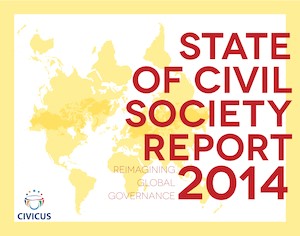This was a central question posed by CIVICUS in its recent report, “Beyond our Two Minutes: State of Civil Society / Intergovernmental Organization Scorecard”. This first of a kind report considered the mechanisms for and effectiveness of the civil society engagement policies in ten prominent international organizations, including the World Bank Group (WBG). It was published as part of the “State of Civil Society Report for 2014” which has become an annual flagship report on the status of civil society worldwide.
 The IGO Scorecard assessed the following IGOs: FAO, OHCHR, ILO, UNAIDS, UNDP, UNHCR, UN Women, WBG, WFP, WTO. The study assessed the civil society outreach policies and practices of the IGOs around four aspects and specifically: access, policy, programs, and empowerment. The perception survey was based on two online questionnaires which CIVICUS sent out earlier this year, one geared to CSO representatives and the other for IGO staff. CIVICUS received a total of 462 responses from CSOs (including 52 which commented on the WBG), and some 200 responses from IGO staff (including 26 from WBG staff).
The IGO Scorecard assessed the following IGOs: FAO, OHCHR, ILO, UNAIDS, UNDP, UNHCR, UN Women, WBG, WFP, WTO. The study assessed the civil society outreach policies and practices of the IGOs around four aspects and specifically: access, policy, programs, and empowerment. The perception survey was based on two online questionnaires which CIVICUS sent out earlier this year, one geared to CSO representatives and the other for IGO staff. CIVICUS received a total of 462 responses from CSOs (including 52 which commented on the WBG), and some 200 responses from IGO staff (including 26 from WBG staff).
Overall, the study found that global governance has undergone “incredible transformation” over the past 20-30 years and there is much more space for civil society to access global organizations today. It notes that “where once IGOs had to justify the inclusion of CSOs in their work, today it is the exclusion of CSOs that requires justification”. It cites as an example the fact that the number of CSOs accredited with the United Nations grew from less than 100 in 1950 to over 3,900 today. Yet the report found that it is not clear how seriously IGOs take civil society outreach, and how much influence CSO leaders exert beyond their ‘two minute’ plenary speeches at UN conferences. The Scorecard found that IGO civil society ‘focal points’ also express concern about how effective their own outreach is, as well as feel that CSOs often lack the technical capacity and skills to influence IGO policies.
Among the specific findings of the Scorecard was the fact that the three most commonly identified obstacles were: member states overriding CSO voices; consultations that had no discernable outcomes; and weaknesses in the outreach mechanisms of IGOs. Conversely, the three priorities cited for improving these approaches were: greater focus on local or regional outreach; need to engage a wider group of CSOs; and the need for more decentralized CSO outreach strategies. It was interesting to note the difference in the priorities for engagement between CSOs and those who work within IGOs. While CSO representatives complained of the lack of access and influence, IGO staff called for greater CSO capacity and pragmatism to engage.
The World Bank Group rated 5th or in the middle of the ranking. The report acknowledged the efforts made by the Bank to engage civil society on various levels of its engagement continuum, and cited the two most recent CSO engagement initiatives: the Global Partnership for Social Accountability (GPSA) and Citizens Engagement Framework. The most frequent ‘obstacles’ cited for the WBG’s efforts to engage CSOs were: i) consultations seem to have no tangible outcomes; ii) outreach mechanisms not accessible enough; and iii) governments override CSO voices. On a positive note, the CSO respondents acknowledged their substantive engagement with WBG staff during the Annual Meetings and the Bank’s increased commitments to consult on new or revised policies.
While this first edition of the Scorecard was based on a relatively limited survey sample and was short on details about each IGO, it represents a significant step in assessing the growing role of CSOs within global organizations. It seems to build on the methodology adopted by UK-based One World Trust in their ground-breaking Global Accountability Report of a few years back which also assessed the participation, access, and compliance mechanisms of international organizations. The difference is that the CIVICUS report focuses directly on IGO civil society engagement policies and practices, and also cross-references the perspectives of staff from both CSOs and IGOs.
Many of these IGOs, including the WBG, have been engaging civil society for decades now with varying degrees of intensity and success, and this IGO Scorecard represents the first time that these approaches are being assessed and rated across the institutional spectrum. As the Scorecard is expanded to include other IGOs and refines its methodology going forward, I am sure that it will be quite useful to both CSO and IGO staff trying to move these relations beyond speech-making and policy dialogue, to effective operational collaboration around the world.